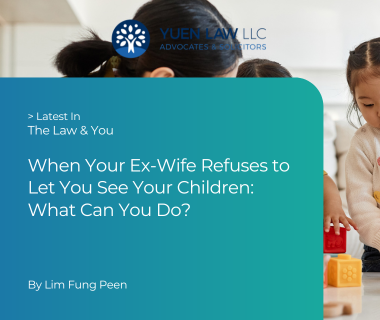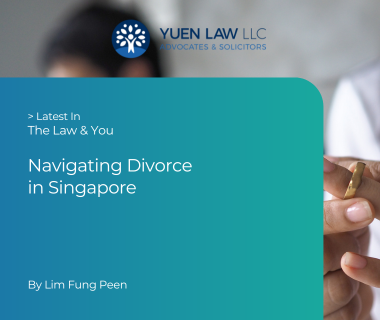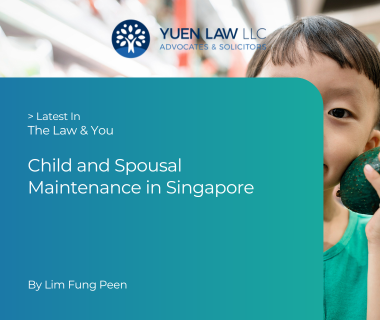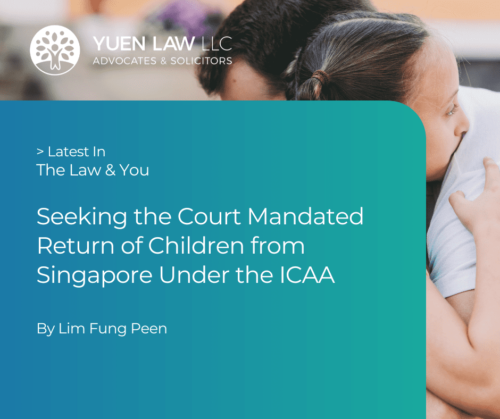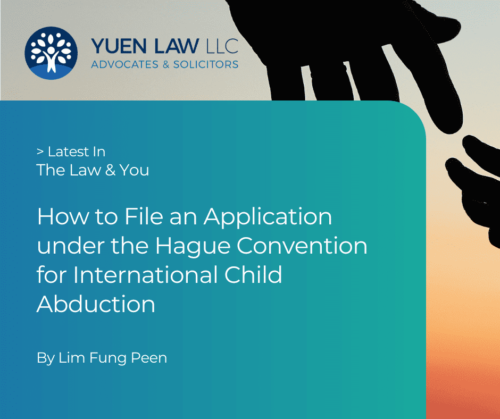In this Article
Many fathers feel disadvantaged when it comes to dealing with the issue of child custody, and care and control. Many fathers have also commented that the odds are stacked against them and that even the law is called the “Women’s Charter”. However, the fact is that Singapore Courts do not shy away from granting custody, and care and control in favour of the father if the circumstances warrant it.
But practically speaking, where the children are young or very young, the Court is more likely to grant joint custody between the father and mother, and care and control to the mother. This is because the Singapore Family Court decides care and control on the principle of the child’s best interest. The reality is that in most cases, the factors in the care arrangements and needs of young children are such that it is in the best interest of the children to be in the care and control of the mother, whole the father is granted reasonable access.
Addressing Fathers’ Concerns
When fathers approach us with concerns about child custody, they often ask us to “fight for child custody.” However, what they are typically referring to is “care and control.” We explain the difference between “child custody” and “care and control” below.
One main concern and fear of fathers is that if he does not have care and control, he will at best be at best “a weekend dad” or at worst he will never see them again. This fear can be real if the soon to be ex-wife is unreasonable or may seek to alienate him from the children. This then raised is the issue of access terms if the mother is granted sole care and control. The Family Courts have revised the law so that mothers who breach access terms will face more serious consequences. These consequences may include mandatory counselling, compensation for denied access, and in more extreme cases, a jail term and a fine.
When is Care and Control Decided by the Family Court?
Care and control are usually decided in the following scenarios:
- Divorce Involving Children Under 21
Even during mediation, where parents attempt to reach an agreement, the Court will still play a role in determining care and control.
- Non-Divorce Application for Custody, Care, and Control
In urgent situations, a parent may apply for an interim order before a divorce case is concluded. This is particularly relevant when waiting for the divorce to be finalized — which may take months or even years in highly contested cases — is not feasible.

Issues Facing Fathers Who Seek Sole Care and Control
The Child’s Primary Caregiver
More often than not, mothers are the primary caregivers who handle day-to-day parenting tasks such as feeding, dressing, bathing, attending Parent Teachers Meetings, and arranging playdates or tuition, This is especially true during a child’s formative years If a mother can demonstrate that she has been the primary caregiver, the Court is more likely to award her care and control.
However, a father who largely fulfils this role will have a stronger chance of persuading the Court for care and control.
Young Children’s Attachment
There is practical presumption, not a legal one, of the “tender years” doctrine, which holds that young children under 7 years old (pre-schoolers or kindergarten) benefit from being under the care of their mothers. This is based on the understanding and presumption that mothers are more nurturing and involved during early developmental stages.
This presumption would be challenging for the father to rebut or displace. However, there have been cases where the mother has little or no maternal instincts and has practically abandoned the child to the father or other care givers such as the domestic helper and grandmother.
Practical Challenges
Fathers seeking care and control must be able to persuade the Family Court Judge that he is able to find a workable balance between his work commitments and ability to handle the child’s day-to-day needs.
Older Children’s Preferences
Fathers have a better chance of getting care and control when the children are older and particularly with sons. Older children are more independent and are better suited to articulate their needs, preferences and reasons. The Court would consider their views in making a decision and would give more weight to the well-articulated views of a mature child.

How Fathers Can Strengthen Their Case
Evidence of Day-to-Day Care
The Court would be better persuaded if a father has evidence of their active involvement in caregiving tasks. Examples include the father picking up or dropping children for school, attending medical appointments, managing extracurricular activities.
Assurance of Fatherly Responsibility
Assuring the Court the father can handle the child’s physical, emotional, and educational needs. Sharing a detailed plan for daily caregiving and explaining how they balance work and parental duties can help bolster the father’s case.
Highlight the Child’s Bond with Father
Providing independent evidence of the emotional bond the father shares with the child are very helpful. This can include testimonies, photos, or communication records that illustrates a close relationship.
Don’ts
The Court expects parents to co-parent even when divorcing. A father who can show a cooperative attitude toward co-parenting and access arrangements are viewed more favourably by the court. Toxic, unreasonable or alienating behaviour towards divorcing spouse will weaken a father’s case.
Successful Cases with Care and Control Awarded To Father
We have acted in cases where the father obtained one of favourable care and control orders: –
Case Study 1:
Sole Care and Control to Father
Father was a successful businessmen based in Singapore with very close bond with 10-year-old son. He was actively involved in his son’s schoolwork and upbringing. The mother, was based in Hong Kong, was loving towards the child but aloof from the child’s daily life.
Case Study 2:
Shared Care and Control Between Father and Mother
In various cases we have acted, we successfully persuade the Court that shared care, and control was in the best interest of the child. This required demonstrating the parents willingness to co-parent, and presenting a highly detailed co-parenting plan.
📝 Note: Shared care and control are rare due to practical challenges, such as the feasible of the child moving between two homes in the middle of a week, it also requires a high level of cooperation between parents, with consistent parenting styles.
Difference between “Care and Control” and “Custody”
It is firstly important to understand the distinction between “care and control” and “custody”.
Care and Control of Child
This is a Court Order giving the responsibility to one parent of the day-to-day care of the child. The parent with decides on everyday matters such as meals, routines, and activities. This is different from custody.
Child Custody
Custody concerns the parental deciding power for major decisions for the child such as medical treatment, education, and religion. In Singapore, custody is mostly granted as jointly to parents as this reflects the expectation of co-parenting by the Family Courts under Singapore Family Law. It is rare for sole custody orders to be made by the Court, though it can be agreed by the parents mutually.
Key Features of Care and Control
Residency
Judges often explain this aspect by simply saying who the child is to live with, especially after a divorce. The parent granted care, and control is responsible for the child’s living arrangements.
Daily Care
The parent with care and control is responsible to makes daily decisions for the child e.g. meals, schoolwork, liaise with the school in Parents Gateway (a digital platform by the Ministry of Education), bedtime routines, enrichment classes, tuition, and Co-Curricular Activities (“CCA”) etc.
Access (Non-Custodial Parent)
As mentioned in the earlier part of this article, the parent who does not have care and control, will be granted access terms in a Court Order. This allows the non-custodial parent to spend time with the quality time with child. Access can include weekend access, overnight access, or holiday access.
Conclusion
Practically speaking, though it is more common for mothers to obtain care and control in Singapore, it does not mean the father does not have a chance. The courts prioritize the child’s welfare and best interests over traditional caregiving stereotypes. The Courts are also wise to parties who try to paint themselves out to be angels and the other parent a monster.
The Singapore Courts will consider giving care and control to fathers who can show what he has to offer in terms of care and attention to be in the child’s best interests. Even if a father is unable to be awarded sole care and control, much can be done for fathers to have detailed and meaningful access arrangements to remain actively involved in their child’s life.
Frequently Asked Questions
Does the parent with more money have a better chance of getting care and control?
No. The Court does not base decisions solely on financial ability. While financial stability is important, the Court also considers the child’s emotional, moral, religious, and physical well-being, as well as the bond with each parent.
Is a child’s welfare only about physical comfort and financial support?
No. A child’s welfare includes their emotional development, moral upbringing, and overall well-being.
What does the court prioritize when deciding care and control?
The Court prioritizes the child’s best interests, focusing on stability and overall welfare.
How Our Legal Team Can Help
With nearly 30 years of experience in Family Law, Lim Fung Peen is a seasoned child custody lawyer dedicated to guiding clients through the complexities of custody disputes with both compassion and strategic insight. His expertise covers a broad spectrum of ancillary matters in contentious divorce proceedings, including sole and joint custody, care and control disputes, access rights, cross-border custody and relocation, child abduction cases, and the enforcement of custody and access orders.
Recognised as a “Litigation Star” in the 2024 Benchmark Litigation Asia-Pacific, Fung Peen is keenly aware of the emotional toll that custody battles can take on families. He emphasizes the importance of mediation and amicable resolutions, helping parents navigate towards practical and sustainable co-parenting solutions. When litigation is necessary, Fung Peen provides robust advocacy to protect his clients’ parental rights, ensuring they are fully supported throughout the legal process.
Contact Information
For more information and/or assistance on matters concerning custody, care and control of children, you may contact:
Lim Fung Peen
Director, Head of Family and Private Wealth Practice Group
E: fungpeen@yuenlaw.com.sg


